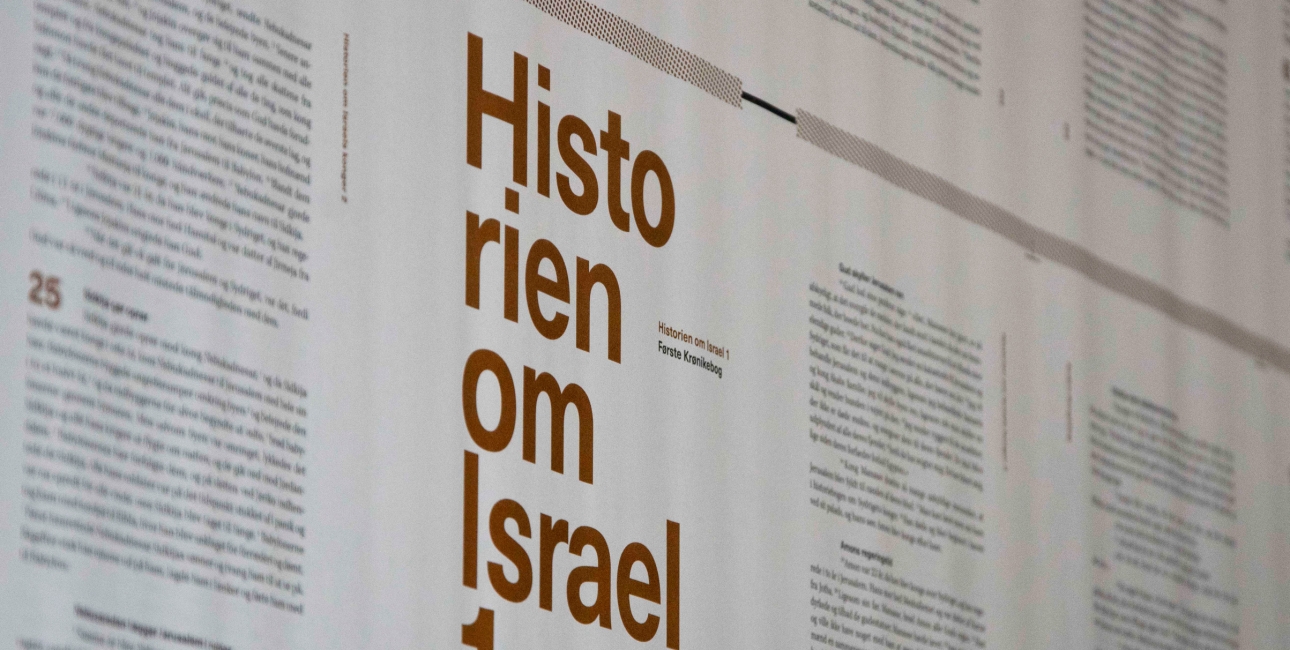
Is the word "Israel" omitted from The Contemporary Danish Bible 2020? Get your facts straight with this Q&A so you can identify the fake news
UPDATE: Please note that several changes regarding Israel have been made in The New Testament in the second edition (published September 2020): The changes have been made where the word Israel indicates a geographic area, e.g. The Gospel of Matthew 2:20-21. Changes have been made in 30 verses. The principle is still to translate Israel to “Jews” or “the Jewish People” where this is the meaning of the text. In the second edition “Israel” and “the Israelites” are mentioned 30 times in The New Testament. No changes have been made in The Old Testament where “Israel” or “the Israelites” are mentioned more than 3000 times.
False information about the new Danish Bible Translation The Contemporary Danish Bible 2020 has been going around. Some news media state that the word Israel and the words Jew and Jewish have been omitted from the translation and also claim that the reason for this would be political and antisemitic. Nothing could be further from the truth. The words Israel and Israelites occur in the translation more than 2000 times and the words Jew and Jewish occur more than 500 times. For instance, Jacob is still given the name Israel in Genesis and the people of God is still called Israel or the Israelites in the Old Testament. Actually, in The Contemporary Danish Bible 2020 The Books of Kings and The Books of Chronicles have both been given new subtitles – namely The History of Israel’s Kings 1 & 2 and The History of Israel 1 & 2.
The Contemporary Danish Bible 2020 is a special kind of Bible translation directed at secular readers with no or little knowledge of the Bible and of its history and traditional church and Bible language. This means that many things are translated differently than in traditional Bible Translations. For instance, it doesn’t use the usual Danish words for sin, grace, mercy, covenant and many other typically biblical words, which an average Danish reader wouldn’t be familiar with the meaning of. In the translation of The New Testament it uses The Jewish People, The Jews, God’s chosen people or simply The People to translate Israel since the majority of Danish readers wouldn’t know that Israel in The New Testament at large refers to the people of God with which he has made a covenant.
The New Testament in Contemporary Danish was first published in 2007. It has been slightly revised up to the publication of The Contemporary Danish Bible 2020. In this revision the question of Israel has not been discussed. In light of the critique raised The Danish Bible Society will carefully consider if specific verses in The New Testament need a revision.
The Contemporary Danish Bible 2020 is an effort to give new readers a chance to experience the word of God’s love in a way that they can understand.
The Contemporary Danish Bible 2020 is not a Bible translation authorized for use in The Evangelical-Lutheran Church in Denmark – it is for supplementary reading. The Danish Bible Society also publishes the authorized version in which Israel is translated traditionally as Israel.
The Danish Bible Society has been listening to the critique raised, and in a new printrun there will be changes in The New Testament where Israel undoubtedly refers to a geographical area such as e.g. St Matthew’s gospel 2:20-21. There will also be other changes made. The principle of translating Israel as ”the Jewish people” or ”the Jews” will however be upheld where it is referring to the people. A decision regarding changes in The Old Testament is to be discussed in a revision committee later in 2020.
Read statement from The Danish Israel Mission: "... this translation does not promote or express replacement theology, or antisemitic or anti-Israel sentiment. Quite the opposite, in fact."
Read more: The author of Jews and Anti-Judaism in Esther and the Church Tricia Miller concludes that if The Contemporary Danish Bible 2020 is read in its entirety, and the translations of Israel are read in their context, it will be difficult for the reader to come away with a belief in replacement theology or anti-Israel sentiment. Click here to read her thorough analysis.
Read more: Australian online media Eternity covers the debate
Q&A: The Contemporary Danish Bible 2020 and Israel
Q: Have you omitted the word “Israel” in The Contemporary Danish Bible 2020?
A: No. In The Contemporary Danish Bible 2020 “Israel” and “Israelites” are mentioned more than two thousand times.
Q: Have you omitted the word “Jews” in The Contemporary Danish Bible 2020?
A: No, the words “Jew”, “Jewish” and “the Jews” are mentioned more than five hundred times in The Contemporary Danish Bible 2020.
For example:
Jesus was born in Bethlehem in Judea, when Herod was king. One day a group of astrologists from the East came to Jerusalem and asked “Where is the baby that is born to be king of the Jews? We have seen his star rise in the East, and we have now come to worship him”.
(St. Matthew’s gospel, 2, 1-2, The Contemporary Danish Bible 2020)
God promised that from among David’s descendants he would choose a man to save the Jewish people, and that he has now done, and his name is Jesus.
(The Acts of the Apostles 13,23, The Contemporary Danish Bible 2020)
Q. Why is “Israel” only mentioned once in The New Testament in The Contemporary Danish Bible 2020?
A. In The New Testament the word “Israel” has been translated into “the Jewish people”, “the Jews”, or “the people” because when the Greek text uses the word “Israel” it is referring to a people with whom God has a special relationship – Jacob’s descendants. However, for the secular reader, who does not know the Bible well, “Israel” could be referring only to a country. Therefore the word “Israel” in the Greek text has been translated in other ways, so that the reader understands it is referring to the Jewish people.
For example:
When Jesus saw Nathanael arrive, he said “There is a person one can trust, a worthy representative of God’s chosen people”.
(St. John’s Gospel, 1, 47, The Contemporary Danish Bible 2020)
Q. How about the word “Israel” in The Old Testament in The Contemporary Danish Bible 2020?
A. In The Old Testament the words “Israel” or “the Israelites” are mentioned more than two thousand times, and “Israel” is still the name given to the Patriarch Jacob after his nightly wrestling match with God in the Book of Genesis.
For example:
“You are no longer to be called Jacob”, said the man. “From now on you will be called Israel, because you cannot be defeated, neither when fighting God nor man”. The man called him Israel, because it means “God’s warrior”.
(Book of Genesis 32,29, The Contemporary Danish Bible 2020)
“Israel” and “the Israelites“ is still the name of the people of whom Jacob became the founding father through his twelve sons.
For example:
Israel shall live in safety.
Your home is safe and rich.
There are vines and corn in the fields.
And the dew falls from above.
No-one is better off than the Israelites!
Which other people have a protector like God?
(Deuteronomy 33,28-29, The Contemporary Danish Bible 2020)
“Israel” is also the name of one of the two kingdoms that arose after the death of Solomon. The northern kingdom was called “Israel” and the southern “Juda”. In The Contemporary Danish Bible 2020 these two kingdoms are called “Northern Kingdom” and “Southern Kingdom”, which are the classical names used in bible studies.
About The Danish Bible Society
The Danish Bible Society is a non-profit, ecumenical and church-based institution. Her Majesty Queen Margrethe II is our patron. The aim of The Danish Bible Society is to publish the Bible and other biblical material, in order to enhance the use of the Bible. The Danish Bible Society is a founding member of United Bible Societies (UBS). As part of UBS we support the international bible cause: Supporting translation of the Bible, distributing the Bible and more.
Bibelen 2020 - softcover

| Sidetal: | 1672 sider |
|---|---|
| Indbinding: | Hæftet softcover med flapper |
| Forlag: | Bibelselskabet |
| Varenummer: | 978-87-7232-228-5 |
|---|---|
| Mål: | 15 x 22 x 4 cm. |
| Udgave: | 3. udgave |
| Andet: | Vægt ca. 1,3 kg. |
